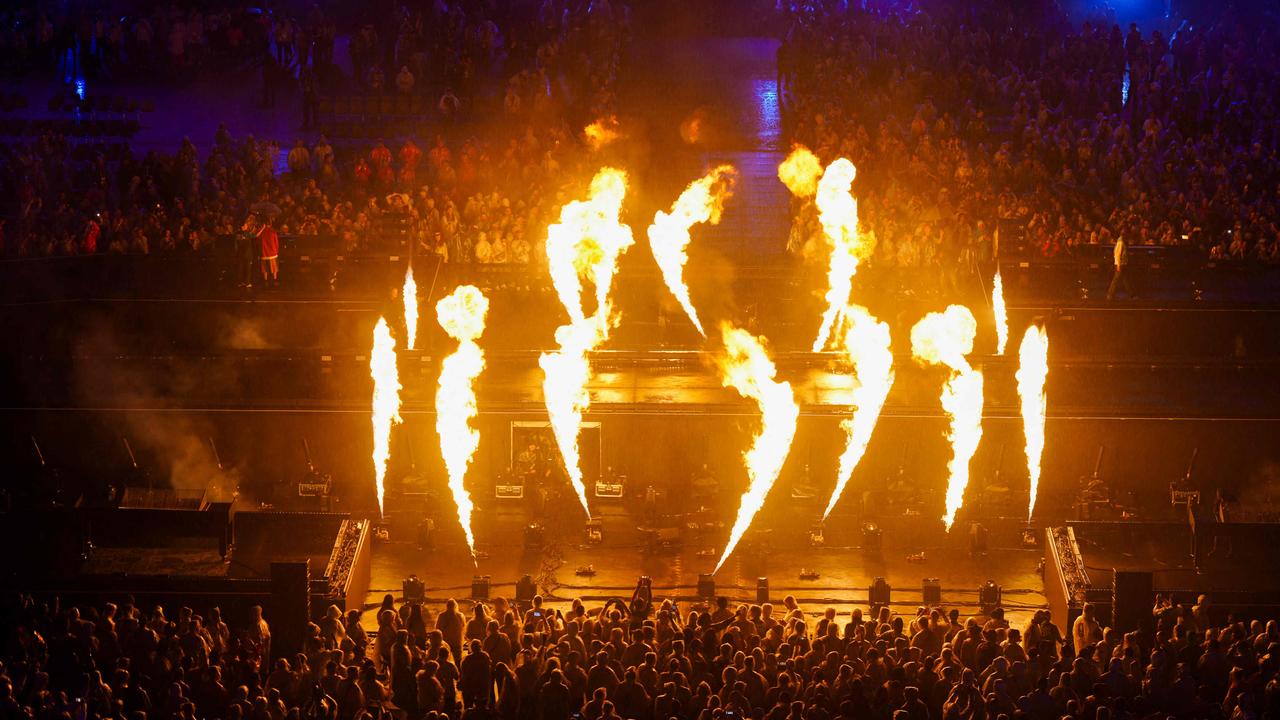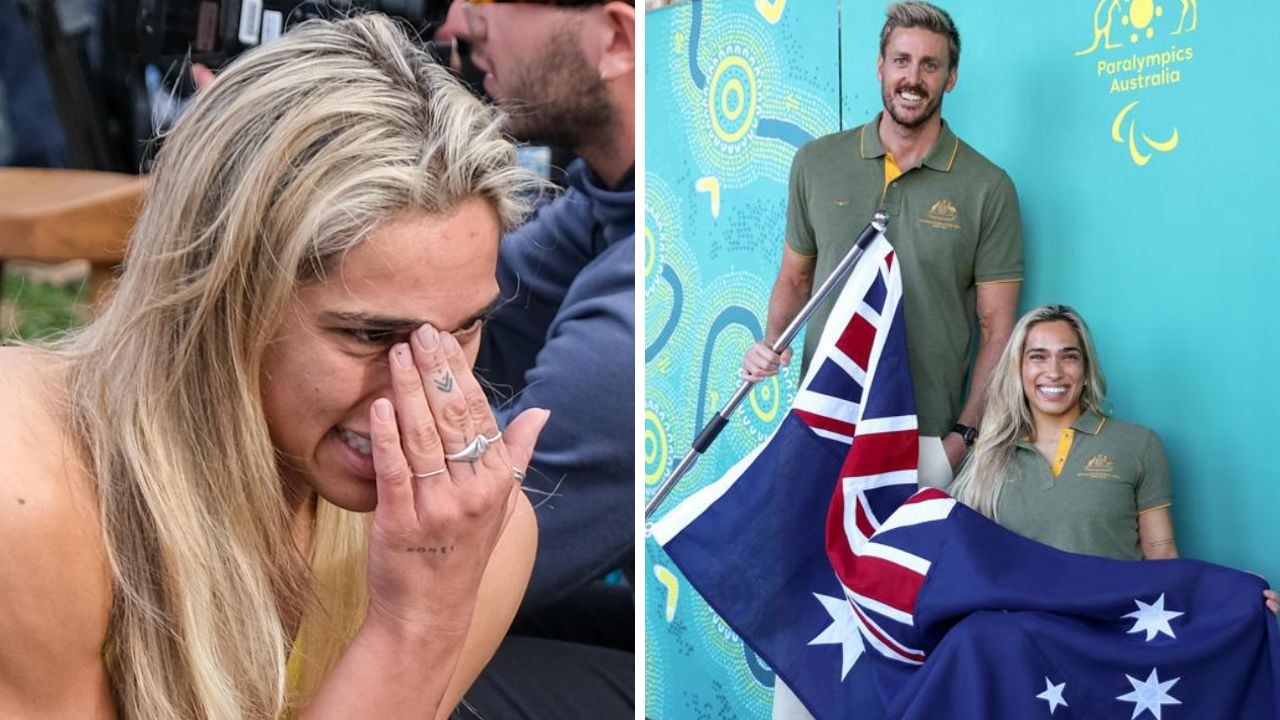Kyle Chalmers is Australia’s new superfish
KYLE Chalmers rocketed onto the map in Rio, coming from nowhere to win gold today. Meet the beefy kid with a toothy smile and feet like Thorpey’s.
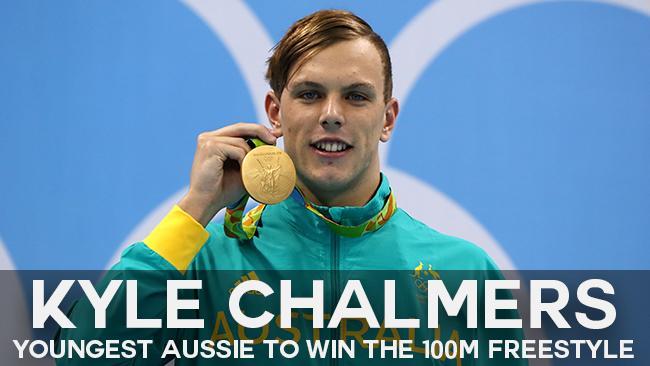
Olympics
Don't miss out on the headlines from Olympics. Followed categories will be added to My News.
THE kid with the toothy smile sat patiently by the pool having photographs of his feet taken.
Kyle Chalmers was just 13 years old, barely recognisable to anyone outside of the remote South Australian fishing town he grew up in — where folks knew him as the son of former AFL player Brett Chalmers.
But the teen’s life was changing rapidly, largely because of a decision to enter a school swimming carnival “for fun” a few years earlier. He’d won the race easily despite the extent of his swimming career consisting of laps in his backyard pool.
Winning meant travelling from Port Lincoln to Adelaide — either an hour on a plane or seven in a car — for the state championships. He swam well enough to make the team for nationals and suddenly his weekly sport commitments included more than footy training.
Brett Chalmers had packed up his family and moved to the city by the time News Ltd organised to meet them at the State Aquatic Centre in Marion.
Kyle Chalmers had started recording times at national championships not seen since the days of Ian Thorpe and his feet — which were comically displayed in the paper the following day — were growing at the same rate as the Aussie swimming legend. Size 15.
“It was going with his age, when he was 11 he was size 11,” Brett, the former Crows and Power player, said at the time. “But he’s only 13½ now, so they’re starting to jump ahead of him. I’m size 11, so it’s a bit different.”


There was an inkling that day in December, 2011, it wouldn’t be long before Chalmers would be known as more than Brett’s son and his results became necessary reading for sports fans in the town.
Chalmers was competitive while competing as an under-age entrant at the World Youth Olympics in 2014 but really put himself on the map the following year when he qualified for the senior national team for the world championships in Russia.
His qualifying time was 0.4 off the world junior record — a mark he had two years still to chase — and certainly made an impression on the team’s alpha male James Magnussen. “I reckon the rest of the world will probably sit up and take notice of that,” Magnussen said.
The boy who grew up dreaming of following his father into AFL ranks had just turned 17 when he was part of a paper-thin Australian team that didn’t even qualify for the final of the 4x100m freestyle relay in Kazan. But he hardly did his own reputation any harm by laying down the third fastest leg of the 120 swimmers who took part in the heats. There were several who went quicker in the finals but Chalmers’ senior international debut had to be considered a success.
Three gold medals at the world junior championships later that year proved the wonderboy had moved beyond competing against people his own age and as he entered the 2016 Olympic trials he was ready to target an individual swim in Rio.
Cam McEvoy was the story of the meet in Chalmers’ hometown as he unleashed the quickest 100m freestyle time of anyone not wearing a speedsuit in history. The rest of the focus after that race was on Magnussen, the headline-grabber who failed to qualify for the team in his pet event.
That was because Chalmers broke the world junior record while finishing second — a result that largely went unnoticed outside of his home state.
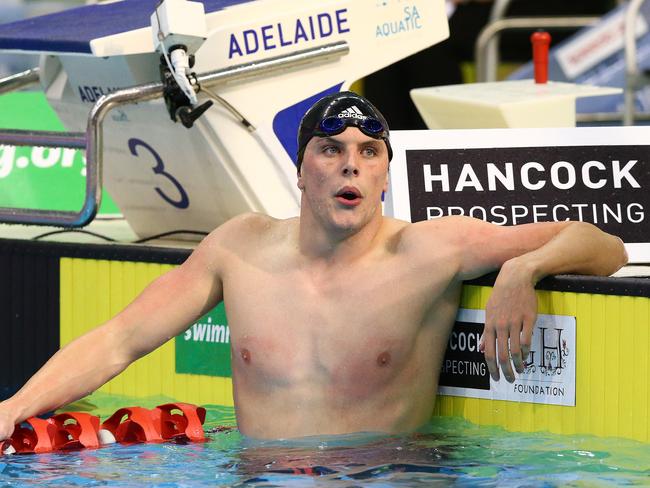
Again there was optimism about his chances of making some noise in his debut Olympics. He dropped big chunks off his personal bests every time he swam at major meets — and big chunks at this stage meant getting somewhere near McEvoy territory.
If Chalmers wasn’t fully on the national radar entering the heats of the 4x100m freestyle relay in Rio, he was after it. He isn’t always the quickest man out but he always came home strong in the back half of a race and despite entering the pool fifth after Magnussen’s lead-off leg, the 18-year-old had put Australia in front by the time he swam his two laps.
“If there’s someone in front of me I always just want to chase them down,” Chalmers said. “Very happy with the race I executed and hopefully I can go a bit faster (in the final).”
Chalmers’ time was a blistering 47.04 — the quickest split of any heat swimmer that morning. His performance revived memories of a prediction made on popular swimming website SwimSwam just after Chalmers qualified for the world championships.
“Winning the relay this summer at Worlds, or especially next summer at the Rio Olympics, would instantly vault Australian swimming back to the pinnacle of world swimming, an inner circle that Australia has started to slip from since the legendary days of Ian Thorpe and Grant Hackett,” blogger Jared Anderson wrote.
“If history is any indicator, that event will come down to one swimmer on somebody’s relay suddenly catching fire and doing something superhuman. In 2008 it was American Jason Lezak; in 2012, France’s Yannick Agnel provided his own relay-rundown fireworks.
“2016 might be a little too early to expect Chalmers to rise to that level with a 46-second split, but it wouldn’t be the biggest shock if he were suddenly among the world’s elite a year from now.”
Unfortunately the prediction was a little too accurate. Again Chalmers swam the second leg for Australia in the final but this time he had even more work to do. A slow lead-off by surprise starter James Roberts left the Aussies in last place.
Chalmers was slow off the blocks but again charged home in the second 50m to push Australia all the way back up to second. Unfortunately the greatest swimmer of all-time, Michael Phelps, was a couple of lanes over. His split of 47.12 was marginally better than Chalmers’ 47.38 and gave America a stranglehold on the gold. Australia took bronze.

“I actually didn’t even look,” said Chalmers post-race, of lining up against the most prolific gold medal winner in history in his first Olympic final. “Was he (also swimming) second? I just swam my own race and didn’t think who I was racing against.”
Chalmers indicated his slightly slower time in the final may have been down to finals nerves and racing at midnight for the first time in his career. “It was good fun though,” he said. “It’s very exciting to get a bronze medal with some of my great mates.”
It left him with the individual 100m freestyle to really leave his mark on these Games. Again, he took the opportunity in the heats.
Chalmers qualified fastest for the semis of the pool’s glamour race by lowering his own world junior record with a time of 47.90. Racing between Americans Nathan Adrian — who had dropped the fastest split of any swimmer in the relay final — and the fast-starting Caeleb Dressel, Chalmers went from last to first in the second 50m to record the third quickest time in the world this year and emerge as a smoky for the event.
He then won his semi-final — again storming home after a slow start — with a time of 47.88, which saw him qualify second fastest for the final.
Alan Abrahamson wrote Michael Phelps’ book No Limits: The Will to Succeed and was clearly impressed with the young Aussie after his semi-final swim.
18-year-old Aussie Kyle Chalmers pulls Phelps-like back half to win men's 100 semi 2, 47.88
— Alan Abrahamson (@alanabrahamson) August 10, 2016
McEvoy, who eased through his heat to qualify fourth fastest before finishing second behind Adrian in his semi — qualifying third fastest for the final — remains favourite but is confident his Rio roommate can challenge.
“He (Chalmers) is ranked first and just snuck under 48 for the first time which is amazing and he’s handled it so well mentally as well,” McEvoy said.
“I’m in the same apartment with him and he has just been so easy going. It’s very much the same way I approach my competition and I definitely think he has a bit more in the tank for tonight and potentially tomorrow night too.”
McEvoy couldn’t have been more accurate — even if it came at his own expense.
The pre-Olympics favourite finished seventh as his young teammate charged home to become the first Australian to win gold in the blue riband event since Michael Wenden in 1968.
He was seventh at the turn but with his trademark surge overpowered the field to touch first in a time of 47.58 and become our youngest swimming gold medallist since Ian Thorpe rose to stardom as a 17-year-old in Sydney.
The world is at his feet.
Jai Bednall is in Rio covering the Olympics for news.com.au.
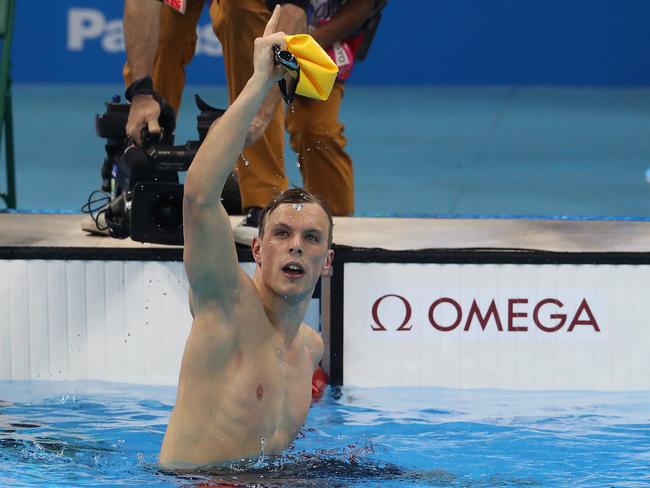
Originally published as Kyle Chalmers is Australia’s new superfish


